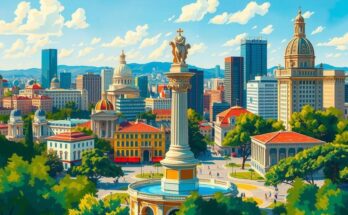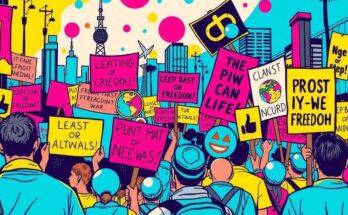On March 21, 2025, South Africa observes Human Rights Day with the UDM reaffirming its commitment to human rights for all. The party advocates for reforms to address gender-based violence, crime, and human trafficking. Alongside individual rights, there is a movement led by VF Plus to recognize group rights, enhancing social justice in a democratic framework. The acknowledgment of diverse identities is seen as essential for a truly equitable society.
On March 21, 2025, South Africa commemorates Human Rights Day, with the United Democratic Movement (UDM) reaffirming its commitment to human rights for all citizens. Nqabayomzi Kwankwa, UDM Deputy President, remarked that this day serves as a reminder of the sacrifices made for justice, equality, and dignity. The UDM is dedicated to ensuring that human rights are actualized in the lives of individuals, not just enshrined in law.
The UDM also emphasizes the need for robust action against pivotal issues, such as gender-based violence, crime, and human trafficking. Their election manifesto calls for reforms in the justice system to promote safety for all citizens. The observance of Human Rights Day underlines the urgent need for legislation that guarantees freedom, dignity, safety, and equal opportunities, enabling individuals to thrive in society.
A growing movement, led by the Freedom Front Plus (VF Plus), seeks to expand the interpretation of human rights to include group rights, thus recognizing the collective identities of various communities. This initiative aims to provide a framework for the rights of groups and minorities, highlighting the inherent connection between individual and communal identities enriched by shared cultures and histories.
The discourse around human rights in South Africa faces challenges concerning the protection of minority rights, vital in any true democracy. Advocates affirm that democracy must extend beyond individual suffrage to include the protection of marginalized communities’ voices against majority dominance.
The UDM’s commitment also involves addressing poverty, inequality, and unemployment through policies aimed at economic inclusion, land reform, and equitable wages. This holistic approach seeks to advance social justice and democratization, ensuring that all citizens benefit from these values.
While Human Rights Day is observed nationwide, the international community observes a similar event on December 10, celebrating the adoption of the Universal Declaration of Human Rights in 1948. The UN’s recognition of group rights in 1992 further illustrates the global complexity of human rights matters, yet South Africa continues to grapple with an apartheid legacy that prioritizes individual rights.
Given South Africa’s rich diversity—including twelve official languages—broadening the understanding of human rights to include all communities is crucial. By doing so, collective identities can be acknowledged without diminishing individual rights, fostering a fuller appreciation of human rights within the framework of democracy.
As we commemorate Human Rights Day, aspirations voiced by both the UDM and VF Plus reflect a desire for a society rooted in freedom, fairness, and dignity. Leaders are urged not only to vocalize their commitments to human rights but to engage in actionable, measurable efforts aligned with these ideals.
In conclusion, the UDM’s ongoing efforts, as articulated by Kwankwa, focus on the collective journey toward realizing human rights. “Let us honour the past by working towards a better future, i.e., a South Africa where freedom, fairness, and dignity are the cornerstones of our democracy,” he stated, encapsulating the day’s significant message.
Human Rights Day serves as a vital reminder of South Africa’s ongoing commitment to ensuring human rights are realized for all citizens. The initiatives led by the UDM and VF Plus aim to broaden the scope of human rights to include both individual and group rights, fostering an inclusive democratic society. The fight for these rights remains a continuous journey that emphasizes the need for equitable representation and the acknowledgment of diverse communities’ identities alongside personal freedoms.
Original Source: evrimagaci.org




